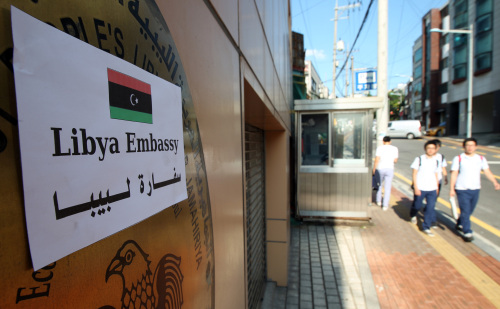KOTRA forecasts bonanza for construction firms, valuing the market at $120 billion
Korean engineering and construction firms are ratcheting up their ambitions in Libya as the waning days of a six-month civil war signal new business opportunities in the North African country.
Colonel Moammar Gadhafi’s fate remains uncertain and rebel forces face a long slog to stabilize the country coming out of a 42-year totalitarian regime. Once peace prevails, however, the long-stalled economy could rapidly thrive given its vast oil reserves and infrastructure projects necessary for the reconstruction drive, experts say.
“There are high expectations that Libya would bring a new market for reconstruction projects as the turmoil begins to calm down,” said Byun Sung-jin, an analyst at Mirae Asset Securities Co. in Seoul.
“But even with a new government, the resumption of ongoing projects and new orders will actually come after next year given lingering uncertainties.”
 |
| A new flag made by Libya’s opposition forces is posted at the Libyan Embassy in Seoul on Tuesday. (Yonhap News) |
The state-run Korea Trade-Investment Promotion Agency (KOTRA) also forecasts a bonanza for builders, valuing the market at $120 billion.
The rebel stronghold of Benghazi would lead a revamp, KOTRA noted, as eastern Libya had been left out of Libya’s pre-war robust economic development. The region accounts for nearly 70 percent of the country’s oil supplies.
“The demand is equivalent to building three or four new towns in the Seoul metropolitan area,” KOTRA said in a report. “The government will likely prioritize sectors such as oil refining, electricity, housing, ports and roads.”
Kang Sin-young, head of the International Contractors Association of Korea’s market research division, said the construction market in a post-Gadhafi era could expand on an unprecedented scale.
“It could go beyond $120 billion,” he said. “Competition would become tougher against European and Chinese builders but Korea has also contributed to the Libyan market so no one knows. We’ll try to bring in as much as we can.”
Prior to the February revolt, 21 Korean builders had been working on various construction projects including thermal power plants, electric cables, hotels and residential complexes.
Their combined orders are worth $36.6 billion as of July, of which a backlog amounts to $7.4 billion, according to the Ministry of Land, Transport and Maritime Affairs.
Hyundai, the front-runner, has secured nearly $3.9 billion worth of deals with the Libyan government over the last decade. Daewoo has also won orders valued at around $3.1 billion since it dipped into the market in 2000. Other firms include Doosan Heavy Industries & Construction, GS Engineering & Construction and Kolon Engineering & Construction.
Shares of the companies, including Hyundai and Daewoo, soared on Wednesday on hopes for future orders.
Most companies remain in a bullish mood, even though they see no plan to redeploy their employees on the scene anytime soon.
“In principle, the market condition would be better than before the civil war and (there will be more opportunities) given our project experience there. But for now we just have to wait and see how things pan out,” a Doosan official said.
Daewoo said it has returned the chief of the Tripoli unit, who left for Tunisia at the height of a rebellion, on Wednesday to get a grip of the situation on the scene.
“It would take some time for the new government to settle down, but we’re expecting a surge in demand for infrastructure construction including power plants, hospitals and schools after the dust settles,” a Daewoo spokesperson said.
The Korean government is stepping up support for the Libyan opposition leaders in efforts to shake off ties with Gadhafi and to pave the way for the firms to resume work as soon as possible.
It provided $1 million in aid to the National Transitional Council and plans to give another $1 million following a request from the cash-strapped rebels, the Ministry of Foreign Affairs and Trade said Tuesday.
A Korean delegation met with the TNC four times in Benghazi between June and July, a ministry official said, and the TNC promised to facilitate the resumption of the projects once the war ends.
The ministry is also considering lifting a ban on traveling to Libya, which was imposed in March.
More than 1,300 workers had been evacuated after a series of attacks by Libyan rioters on some construction sites in February. Only three staff members each from Daewoo and Hanil Engineering & Construction Co. stay there at present.
On Tuesday, 17 corporate executives called for the removal of the travel restrictions at a meeting hosted by the Ministry of Land, Transport and Maritime Affairs.
“What we need the most at the moment is being on the spot,” Kang of the ICAK said. “Then companies will be able to meet with the authorities in each region to settle problems concerning any damage or loss on the site.”
To gain a firm footing in the Libyan market, Korean industry leaders should entail humanitarian aid policies, said Kwak Dong-woon, chief of KOTRA’s information consulting unit.
“Libyans regretted that in the past Korean companies had approached the market seeking only economic benefits,” he said. “They now should embrace social efforts involving recovery aid and corporate responsibility activities.”
By Shin Hyon-hee (heeshin@heraldm.com)



No comments:
Post a Comment